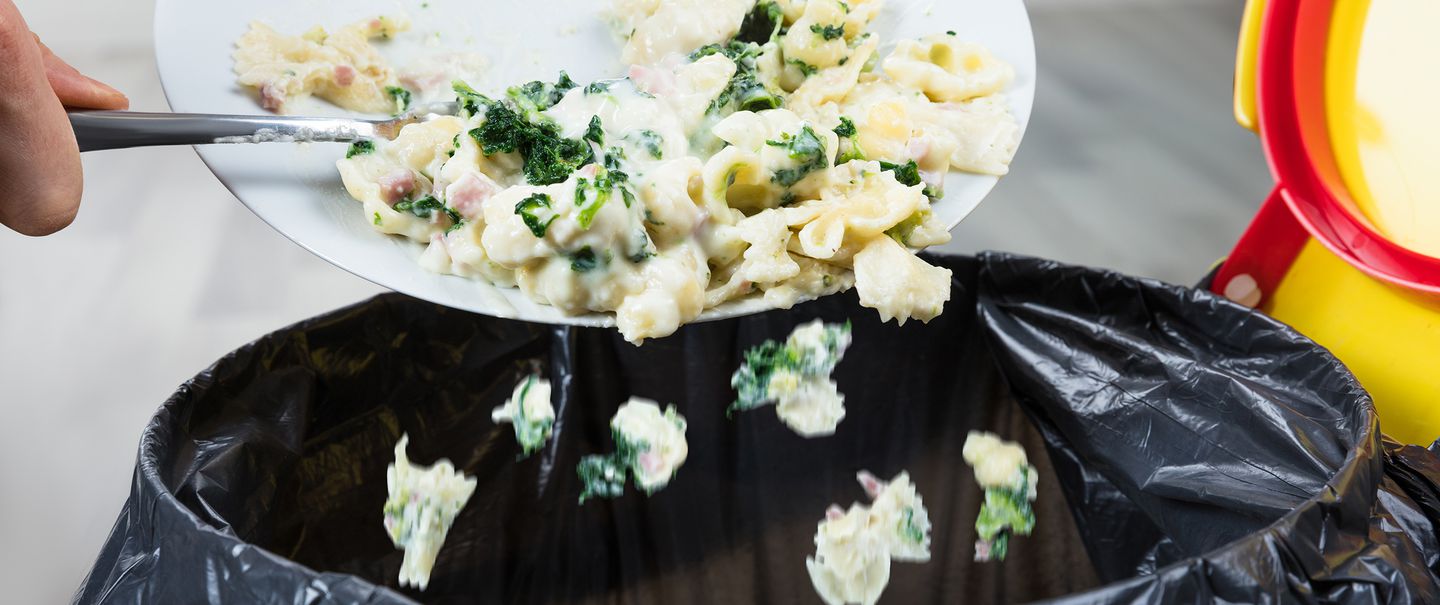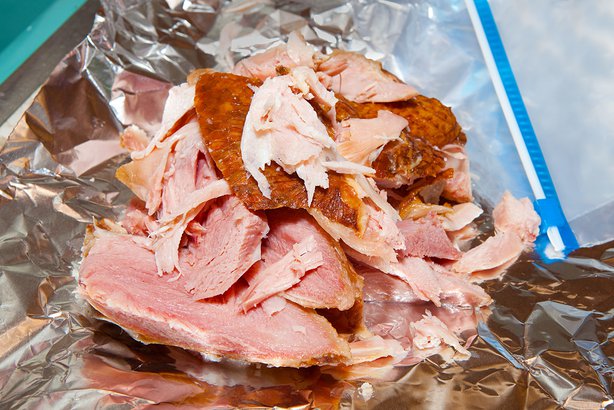How Long Can Unopened Cream Cheese Stay Unrefrigerated
Cheapism's independent editorial team finds the best for less. If you buy through our links, we may earn a commission to support our work. Learn more


When to Toss 25 Unrefrigerated Foods
We've all been guilty of letting perishable foods sit out perhaps a bit too long, then wondering what dishes or ingredients are still safe to eat. Luckily, there's a wealth of information available on food safety, so that you can be sure you're not wasting good leftovers, or accidentally ingesting spoiled, bacteria-laden ones that you really should avoid. Here are 25 everyday foods and how long you have to eat them while unrefrigerated before they present a danger to your health and should be tossed.
Related: 15 Foods That Are Always Better as Leftovers

Butter
Time: One to two days
Most refrigerated sticks of butter will last up to one month after the sell-by date on the package. Unlike most dairy products, however, butter is a food that can also survive at room temperature without spoiling for one to two days, thanks mostly to its low lactose levels and high saturated fat content.
For more great kitchen tips, please sign up for our free newsletters.

Cheese
Time: Varies, around two to 12 hours
Leaving cheese out overnight can affect quality, but isn't typically dangerous or a safety risk, the Wisconsin Milk Marketing Board says. In fact, all but fresh or shredded cheeses such as feta or mozzarella should be given an hour on average to come to room temperature with no risk of developing dangerous bacteria levels, when hard cheeses become easier to cut and soft ones easier to spread. Be more careful about the latter after several hours, as soft cheeses are a more perishable food that more easily encourages bacterial growth.
Related: 19 Ways to Make an Ordinary Grilled Cheese Sandwich Extraordinary

Cooked Food/Leftovers
Time: Around two hours
If you get distracted and leave cooked food out after dinner or for a party buffet at home, have a policy to take care to refrigerate the leftover foods after roughly two hours, when the danger of contracting sickness from perishable food begins to increase fast. If the ambient temperature is over 90 degrees, especially in the sun, the food shouldn't be left unrefrigerated for longer than an hour.
Related: 15 Themed Dinner Party Menus Under $5 Per Person

Lunch Meats
Time: Around two hours
According to FoodSafety.gov's recommendations, which err on the side of caution, cold cuts and other sliced deli meats used for wraps or sandwiches won't last any longer out of the fridge than raw or regular cooked meat. To avoid the danger of bacterial growth, it's best to discard these foods either after two hours in temperatures of from 40 to 140 degrees.
Related: What Kids Around the World Eat for Lunch

Fruit Pies
Time: Two days
Apple and other fruit pies need not be refrigerated right after baking — instead, leave them on the counter or in the pantry for about two days before storing in the fridge. From there, the pie should be eaten or discarded within four to five days to avoid bacterial growth, during which time individual slices can sit at room temperature (though perhaps avoid leaving them directly in the sun) two to three hours without risk.
Related: 22 Classic Pie Recipes

Lettuce and Greens
Time: Around two hours
Precut or prewashed greens won't survive safely at room temperature for much longer than two hours (and will wilt if placed directly in the sun); raw spinach, kale, or romaine lettuce are only slightly heartier, with outer leaves of intact heads of lettuce or cabbage spoiling first. All of these greens can last from seven to 10 days when refrigerated.
Related: 25 Veggies to Buy Instead of Kale

Yogurt
Time: Around two hours
Yogurt and other dairy products can be left to sit for two hours before bacteria begin to grow, making them potentially unsafe to eat before long. This process is accelerated at temperatures over 90 degrees (read: keep your Yoplait out of the sun), or in yogurts with added fruit and sugars, as most milk-based products (with the exception of butter) are quick to spoil and taste better cold, anyway.

Mayonnaise
Time: Around eight hours
Unopened mayonnaise can be kept in the pantry indefinitely, but once opened, the egg yolk-derived condiment quickly becomes vulnerable to spoilage and bacterial growth if left out. FoodSafety.gov recommends discarding mayonnaise after sitting at above 50-degree temperatures for more than eight hours, so keep it cold and out of the sun or don't open it.
Related: 10 Fast-Spoiling Foods to Avoid

Mushrooms
Time: One day
Mushrooms flourish away from the sun before picking, and they will enjoy a dark corner of your fridge afterward, too. If left accidentally on the counter overnight they will still be safe to eat — just check for brown or slimy spots that should be cut off after too long. Once cooked, however, mushrooms became like most other prepared foods in that they shouldn't be kept at room temperature more than two hours.
Related: 35 Foods You Wouldn't Think to Grill But Should Definitely Try

Jelly
Time: One to two days
The acids and natural or added sugars in jellies and jams act as natural preservatives to keep bacteria at bay. so an opened jar left at room temperature for one to two days will be fine, provided there are no signs of spoilage such as mold or strange odor. If refrigerated, jellies will remain at peak quality for roughly an entire year. Don't leave it out in the sun, but don't worry too much, either.
Related: 16 Jam Recipes to Preserve Fresh Fruit Flavors

Peppers
Time: One to two days
Whether bell or jalapeño, raw peppers can be left to sit at room temperature for multiple days without concern. For the longest shelf life, however, it's best to have a policy to store them in airtight containers or bags in the fridge for one to two weeks. Raw cut or cooked peppers can also stay in the fridge for three to five days. It's best to cut them up when you want to eat them, but they shouldn't sit out longer than two hours.
Related: 28 Recipes to Use Up the Bulk Food You Overbought at Costco

Tomatoes
Time: One to five days
Tomatoes are a countertop-safe vegetable with a high production rate of ethylene, which means they can be used to speed up the ripening process of nearby fruits or vegetables (read: put them next to those green bananas if you want to eat them sooner rather than later). Fresh tomatoes will ripen fully in one to five days, after which they can be stored in the fridge for another five to seven before these perishable fruits begin to mold.
Related: Eat Seasonal and Save: When to Buy Fresh Produce Year-Round

Bananas
Time: Two to five days
Only refrigerate bananas once they've reached the desired ripeness, which keeps them suitable for eating another five days even as the skin darkens. Before then, they're best stored at room temperature for several days while they ripen to yellow-brown or brown for baking, as with most other countertop-safe fruits. Unless you like banana bread, have a policy to eat these sun-loving but perishable fruits when there's just a touch of green instead of freckled.
Related: Banana Lovers Rejoice: 20 Cheap and Easy Recipes

Bread
Time: One week
Though pre-sliced or whole loaves can be frozen for long-term storage (save money by freezing sale-priced loaves), refrigeration is almost never recommended for bread, as it can quickly turn a loaf dry and stale. Whether sliced or not, soft-crusted breads keep for five to seven days on the counter, while hard-crusted breads like baguettes last only a day or two.
Related: 50 Beloved Hometown Bakeries Across America

Basil
Time: Seven to 10 days
Basil is the rare, sun-loving fresh herb that shouldn't be refrigerated, lest its highly perishable and moisture-sensitive leaves begin to spoil and turn black. Basil stored at room temperature can last from seven to 10 days. Read: To maximize that shelf life, trim the basil's ends and place the stems in an inch or so of water covered by a loose-fitting plastic bag.
Related: How to Grow Plants and Vegetables From Kitchen Scraps

Potatoes
Time: One to two weeks
Refrigeration converts some of the starches in raw potatoes to sugars (the versatile spuds are best stored in a dark, cool pantry for a shelf life of one to two weeks). Cooked potatoes can last three to five days in the fridge, though not at peak quality; for prep work, raw cut potatoes can be submerged in cold water and refrigerated for up to 24 hours before cooking.
Related: Celebrate Spuds With 27 Tasty Ways to Cook Potatoes

Avocados
Time: Two to seven days, until ripe
Avocados should be stored at room temperature until fully ripened, at which point the skin will feel slightly soft when squeezed. Then they can be used promptly or kept for longer within the fridge (they'll stay good another three to five days). Avocados puréed with a dash of lemon juice can also last months longer in the freezer.

Tortillas
Time: Two to four weeks
Opened or unopened flour and corn tortillas can last up to a month in the pantry — or more conservatively, up to one week after their "best by" date. They'll last another two to six weeks once refrigerated. This will tend to dry them out, like with bread.
Related: 21 Delicious and Inexpensive Mexican Dishes

Ketchup, Mustard, Barbecue Sauce, and Other Acid-Based Condiments
Time: One month or more
Many of the most common condiments last perfectly fine outside the fridge, including ketchup and barbecue sauces – both will keep up to one month at room temperature. The timeframes are even more generous in more acidic condiments such as mustard (two months), soy sauce (one year), and hot sauce (three years).
Related: 25 Finger-Licking Barbecue Sauce Recipes

Onion
Time: Two to three months
Keep whole raw onions in a loosely covered container in the pantry at temperatures of 45 to 55 degrees to make them last up to three months (the same length they would last in the fridge, where they should be stored only once chopped or in especially hot locations). Take care not to keep them near potatoes, as the two veggies in close proximity can accelerate each other's spoilage.

Garlic
Time: Three to five months
At ideal temperatures of 55 to 60 degrees, bulbs of garlic will keep on the counter for nearly six months before spotting and turning soft with spoilage, while unpeeled individual cloves will last seven to 10 days. Garlic will usually start to sprout before going bad, so cooks may want to remove the green sprouts to get rid of their bitter (but otherwise harmless) taste.
Related: 24 Condiments From Around the World to Add Zing to Any Meal

Almond Milk
Time: Varies
Some non-dairy milks such as almond or soy are ultra-pasteurized and sealed in Tetra Pak cartons, allowing unopened containers to be stored at room temperature for up to a month. Once opened, however, ultra-pasteurized and other almond milks (sold refrigerated) should be used within seven to 10 days, and not left out unrefrigerated for longer than two hours.
Related: Is Homemade Salad Dressing Cheaper Than Store-Bought?

Salad Dressings
Time: Varies
Premade salad dressings vary widely in terms of flavor and ingredients, but the chief consideration in evaluating shelf life once opened should be whether the dressing is cream-based or vinegar-based. Vinegar-based sauces contain natural preservatives that can keep them safe at room temperatures after several hours, whereas cream-based sauces such as ranch or blue cheese dressing should be tossed after two hours sitting out.
How Long Can Unopened Cream Cheese Stay Unrefrigerated
Source: https://blog.cheapism.com/how-long-before-unrefrigerated-food-spoils/
0 Response to "How Long Can Unopened Cream Cheese Stay Unrefrigerated"
Post a Comment